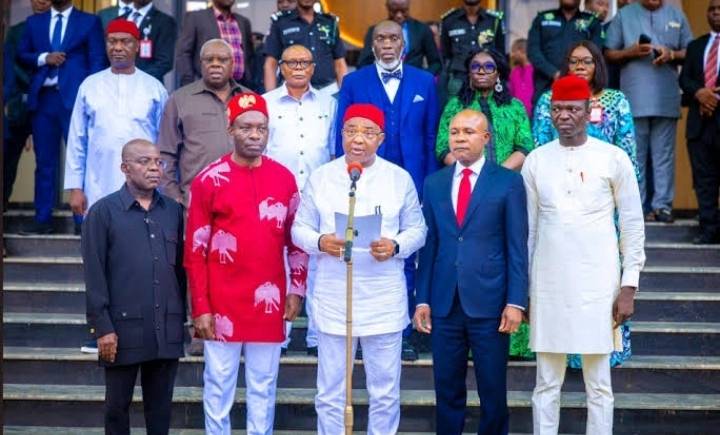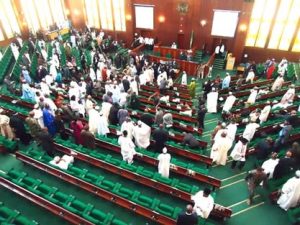Ohanaeze Gives South-East Governors 30 Days to Expel Killer Herdsmen or Face State of Emergency
In a bold and forceful statement that has sent ripples across the political landscape of southeastern Nigeria, Ohanaeze Ndigbo, the apex Igbo socio-cultural organization, has issued a stern 30-day ultimatum to the governors of the South-East states. The body has called for immediate action to identify and expel violent herdsmen from the forests and rural areas of the region. The deadline, which was set on April 8, 2025, is a direct response to the disturbing reports of insecurity and escalating violence that have marred the region in recent months.
Ohanaeze’s statement, delivered by the Deputy President of the organization, Mazi Okechukwu Isiguzoro, expresses deep concern over the alarming rise in violent attacks attributed to Fulani herdsmen in the South-East. According to reports, over 300 people have lost their lives in the first quarter of 2025 alone, making it one of the deadliest periods for the region in recent memory. The attacks, which have been concentrated in rural communities, have sparked fear and outrage among the Igbo people, who are increasingly questioning the failure of their governors to ensure the safety and security of their people.
In the statement, Isiguzoro emphasized the growing frustration of the people of the South-East, who have borne the brunt of violence that has escalated to the point where it is no longer just about the destruction of farmlands or the stealing of cattle, but the loss of innocent lives and the destabilization of entire communities. The violence, which Ohanaeze claims is perpetuated by herdsmen with criminal motives, has reached a point where it is now viewed as a national crisis that demands immediate and uncompromising intervention from the state and federal governments alike.
YOU MAY
South East States’ Contributions to VAT Pool and Benefits Received (January to October 2024)
Ohanaeze Ndigbo, a body that represents the interests of millions of Igbo people, has long been a vocal advocate for the protection of the region’s socio-economic and cultural interests. However, the recent spate of killings has pushed the organization to take a more radical and direct stance against what it sees as the inability of South-East governors to act decisively on security matters. The group has expressed disappointment in the lack of effective leadership from the governors, accusing them of being indifferent to the growing insecurity in their states.
In the statement, Mazi Isiguzoro lamented that despite numerous calls for action, including requests for the establishment of regional security outfits similar to the Amotekun initiative in the South-West, governors in the region have failed to take adequate steps to secure the safety of their people. The delay in taking proactive measures to curb the violence, he argues, has emboldened the perpetrators and created a situation where the region is at the mercy of criminal gangs disguised as herdsmen.
“We have lost over 300 souls in the first three months of 2025. This is unacceptable, and it is a direct challenge to the capacity of the South-East governors to secure their people,” Isiguzoro stated. “We are giving them 30 days to take decisive steps to rid our forests and rural areas of these killer herdsmen. If they fail to do so, we will be left with no choice but to call for the declaration of a state of emergency in the affected states. The people of the South-East are entitled to live in peace, and we will not accept further inaction.”
The alarming increase in attacks by herdsmen, which Ohanaeze attributes to a combination of criminality and the expansion of cattle herding into non-traditional areas, has left many Igbo citizens questioning the capacity and willingness of their state governors to protect them. The attacks have primarily targeted farmers and rural communities, with reports of people being killed in their homes, fields, and along rural roads. Women and children have been particularly vulnerable, with some survivors recounting harrowing tales of abductions, rapes, and other forms of violence.
YOU MAY READ
Over 250 South-East Residents Abducted Between Last December And January As Kidnappers Rake In Millions Of Naira
Ohanaeze Ndigbo has expressed the belief that the continued existence of killer herdsmen in the South-East is an affront to the dignity and safety of the Igbo people. The group has thus called on the governors to step up their efforts to eliminate these violent elements from the region, as failure to do so could have far-reaching consequences for the stability of the entire southeastern geopolitical zone.
The 30-day ultimatum issued by Ohanaeze Ndigbo has placed South-East governors under intense pressure to act. For months, the governors have been criticized for their inability to address the increasing insecurity, and Ohanaeze’s latest move has only added fuel to the fire. Critics of the governors have pointed to the failure to create an effective regional security apparatus, despite growing calls from various stakeholders, including civil society organizations, political leaders, and community groups, for enhanced protection against the rising tide of violent attacks.
A significant part of the criticism is directed at the governors’ reluctance to enact tougher laws to protect farmers and local communities from violent herders. Unlike the South-West, which established Amotekun — a regional security outfit aimed at combating criminal activities — the South-East has struggled to implement a similar strategy. While the establishment of a regional security outfit has been discussed extensively, political disagreements and lack of cohesion among the governors have resulted in inaction.
In response to the ultimatum, some South-East governors have expressed concern that a state of emergency could worsen the already volatile situation. They argue that the deployment of federal forces to manage the security crisis could lead to further militarization of the region, which could exacerbate tensions between herders and farmers. However, critics contend that the failure of local authorities to take adequate action has forced the hand of Ohanaeze Ndigbo, pushing the organization to escalate its demands.
YOU MAY READ
South-East sudents to EFCC: “We are Sorry for the Loss of your Officer”.
The South-East has long been a region of political importance in Nigeria, with its rich history, cultural heritage, and economic contributions. However, the recent spate of killings and abductions has raised alarm bells about the ability of the region’s political leadership to guarantee the safety and well-being of its citizens. This has sparked calls for stronger, more coordinated efforts to tackle the growing security challenges facing the region, and to ensure that the people are not left to fend for themselves.
The challenge posed by violent herdsmen is not unique to the South-East. Across Nigeria, the growing prevalence of herder-farmer conflicts, particularly in the Middle Belt and parts of the South, has sparked widespread concern about the future of the country’s national unity and stability. The Federal Government has been urged to take stronger action against the perpetrators of violence, especially as it appears that in many cases, the herders are able to operate with impunity.
In response to the worsening security situation, Ohanaeze has signaled that it may take its concerns to the federal level if the South-East governors do not take immediate steps to address the situation. The group’s leadership has indicated that it will not hesitate to call for a state of emergency to be declared in states that are unable to guarantee the safety of their citizens.
“We have tried to engage with the governors and encourage them to take action, but it is clear that they have failed in their primary duty to protect the people. If there is no change in the next 30 days, we will call on the Federal Government to step in and declare a state of emergency in any affected state,” Isiguzoro warned.
YOU MAY READ
Southeast Loses 17.4 Trillion Naira Due to Absence of Sixth State
The idea of a state of emergency has raised concerns among some political analysts, who worry that it could lead to further unrest and worsen the already fragile security situation in the region. Others, however, believe that such a move could provide the necessary impetus for the federal government to intervene decisively and restore order.
The human toll of the ongoing violence has been devastating for the people of the South-East. Reports from local communities reveal the harrowing stories of families who have lost loved ones to the violence. In rural areas, particularly in states like Imo, Ebonyi, and Enugu, the daily lives of residents have been disrupted by the constant threat of attacks from herdsmen.
“I lost my father and two brothers in one night. They were attacked on our farm while working. The herdsmen came with guns and machetes, and before anyone could do anything, they had killed them,” said Chidinma, a resident of Imo State. “The police were called, but they never arrived in time. It’s been like this for months, and nothing has changed. We are living in fear.”
YOU MAY READ
Millennium City Awka: Revolutionizing Urban Living in Southeast Nigeria
In addition to the loss of life, the violence has also led to widespread displacement. Many farmers have been forced to abandon their fields, while entire communities have been uprooted from their homes due to the threat of further attacks. The economic impact has been devastating, as many people in rural areas depend on agriculture as their primary source of livelihood.
Ohanaeze Ndigbo has vowed to continue its advocacy on behalf of the victims of these attacks, pushing for justice and accountability for the perpetrators. In its statement, the group emphasized that it would not rest until the people of the South-East are guaranteed the safety and security they deserve.
The 30-day ultimatum issued by Ohanaeze Ndigbo to the South-East governors marks a turning point in the fight for justice and security in the region. With the eyes of Nigeria upon them, the governors are now faced with the difficult task of addressing the growing threat posed by violent herdsmen or risking further alienation from their people. As the clock ticks down, the future of the South-East and the stability of its political leadership hang in the balance.
Whether the governors will rise to the challenge and deliver on their promises of security remains to be seen. What is clear, however, is that the people of the South-East are no longer willing to accept inaction or indifference to their plight. The time for change is now, and the consequences of failing to act could be dire.





